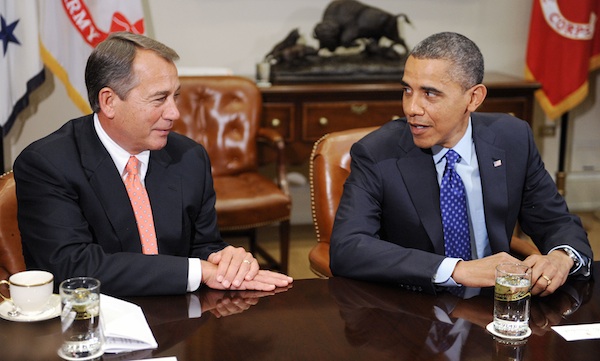Washington – House Republicans approved a temporary suspension of the $16.4 trillion ceiling on the nation’s debt Wednesday, allowing the federal government to continue borrowing through spring while Washington shifts to more ambitious budget battles.
Speaker John A. Boehner, R-Ohio, persuaded his rebellious majority to go along with the new strategy by promising them the opportunity in the months ahead to extract deep spending cuts to Medicare and other domestic programs.
The approach was a seismic political shift for Republicans who in the past had pressed for simultaneous cuts, and House Democrats dismissed the move as “irresponsible” and a “gimmick.”
The vote was 285-144, and despite the robust support it would not have passed without Democrats – 33 Republicans opposed.
“We know with certainty that a debt crisis is coming to America,” said Rep. Paul D. Ryan, R-Wis., the former vice presidential nominee, who helped lead the debate on the House floor as chairman of the House Budget Committee. “We have a moral obligation to fix that.”
Republicans are preparing an extraordinary fiscal plan, due in April, that would bring federal budgets into balance in 10 years – an austerity measure far more severe than last year’s budget from Ryan that slashed the safety net.
After President Barack Obama won modest tax hikes on the wealthy in the year-end fiscal cliff deal, Republicans say the next round of savings must come from the spending side of the ledger.
“Whatever new taxes the president is going to get, he got,” Senate Minority Leader Mitch McConnell, R-Ky., said this week. “We’re now going to focus on the real problem, which is not that we tax too little, but that we spend too much.”
The White House, and Democrats in Congress, disagree and say more tax hikes – especially closing corporate tax loopholes – must be part of the equation. Two deadlines in March will force the issue.
“Democrats are eager to contrast our pro-growth, pro-middle class budget priorities with the House Republicans,” said Sen. Patty Murray, D-Wash., the chairman of the Senate Budget Committee. She said the GOP budget under Ryan “would end Medicare as we know it, gut investments in jobs and programs middle class families depend on, and cut taxes for the wealthiest Americans and biggest corporations.”
The vote Wednesday puts the White House and Congress on another collision course in the budget battles that are expected to consume the first months of Obama’s second term.
On March 1, the federal budget faces $1.2 trillion in automatic spending cuts that both sides want to alter. Later, on March 27, Congress will need to approve funding for routine government operations, or risk a shutdown.
By May 18, the debt ceiling would need to be raised again after this suspension expires, though the Treasury Department could take measures to extend borrowing into summer.
Failure to raise the debt limit to cover the nation’s already accrued bills would send the country into a first large-scale default – what Obama has compared to dining and dashing out on the bill.
Democrats in the House complained that Republicans were simply setting up another fiscal cliff.
“House Republicans continue to play with economic fire,” said Rep. Sander Levin, D-Mich.
The bill approved Wednesday now goes to the Senate, and the White House has said the president would not oppose it.
Even though conservatives off Capitol Hill remain divided over raising the debt limit, Boehner sweetened the legislation to attract Republican support by attaching a provision that would temporarily withhold the pay of senators or representatives if their chamber fails to produce an annual budget by the mid-April deadline.
The “no budget, no pay” provision was particularly popular with conservatives, and was aimed squarely at Senate Democrats, who have declined to approve a formal budget in recent years.
___
(c)2013 Tribune Co. Distributed by MCT Information Services.







